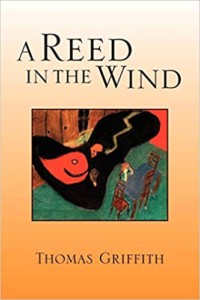Title: A Reed in the Wind
Author: Thomas Griffith
Publisher: Xlibris
ISBN: 978-1-4363-7309-8
Genre: Poetry
Pages: 273
Reviewed by: Gary Sorkin
Pacific Book Review
In and out of psychiatric institutions since his early 20’s, poet Thomas Griffith is well familiar with what he calls the “Eternal cycle of struggling with conflicts, and on the flip side, the satisfaction which comes from resolving them.” In his book of poems, A Reed in the Wind, Griffith writes about his life living with schizophrenia, and reveals an emotive experience unlikely to be read about elsewhere.
A Reed in the Wind is the stuff modern poetry is made of. It combines elements of philosophy, religion and classic literature into a style all its own. Its city poetry, pounded out in the concrete jungle of his environment, and the maelstrom of his mind. Griffith’s poetry is stunned and awed by the violence called life, the universal balance which calls for the sacrifice of one life in order to preserve another. It is white-collar crime and hallucinogens.
We could also call the book epic poetry, for the length of the poems and the way they tell a story; although I doubt Griffith would call himself a hero. His poems smack of the anti-hero; a person you can’t help but ally yourself with, despite their obvious faults.
Rather than overcoming a great hurdle, like a cliché Hercules, the poems are vaguely existential. Griffith lives with schizophrenia, a condition he describes in his poetry as, “Easy to diagnose / But virtually impossible to treat.” He resigns himself to this, and instead of making great fanfare, simply gets along as best he can. Griffith writes: “I have never been in charge of my existence… Instead he was just/ A leaf in the wind/ Or a twig being carried by a stream.”
My favorite piece is from “The Absurd Or The Jungle Gives a Colder Stare.” Initially you think the protagonist is a cat called Fog Gears, but the story quickly becomes a cat-andmouse game with a mouse called Sub-Cycle Tears, who eventually takes over the narrative. Maybe, the poem leads you to think, the protagonist is both the cat and the mouse, and the games you play are only ever in your head and you only ever play them with yourself. Eventually, the mouse escapes the game, and the story turns to his existence and recovery. There are a few lines in which Sub-Cycle contemplates his smoking habit, and expresses it in his usual, visceral way: “On these grounds the mouse reasoned/ The health risks of smoking/ Were acceptable trade-offs/ For making his existence bearable.” The idea of the cigarette as a therapist is not a new one, and yet in Griffith’s poem, it is totally unique. Just as each of us experience our lives in a totally original way, so does the raw writing of Griffith’s form make the cigarette-therapist stunning and new.
A Reed in the Wind makes the city stunning and new, and Griffith’s writing is just the thing to open our eyes to a wholly different experience from our own. When Griffith’s poetry turns spiritual, he reveals within himself a mixture of Buddhism and Christianity and Naturalism. As readers, we look out the window of our “alien concrete honeycombs, apartments” and finally see the entropy and enthalpy balancing our own busy, bustling lives.



Follow Us